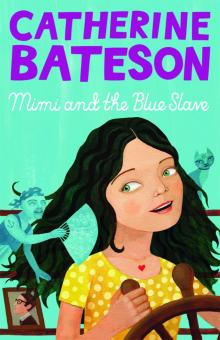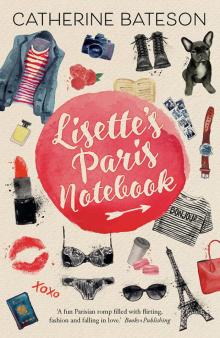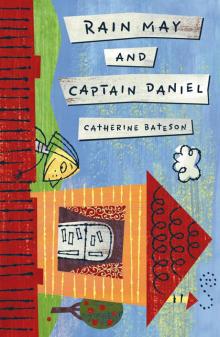- Home
- Catherine Bateson
Lisette's Paris Notebook Page 20
Lisette's Paris Notebook Read online
Page 20
He was gone before I could reply, taking the narrow stairs two at a time. The front door crashed and I was standing by myself, cradling a half-made doll’s tunic in my arms. I couldn’t breathe – it was as though he’d taken all the oxygen in the room with him. I sat down on the bed. That was that, then. I’d let him go. I’d joined my family of mourners. There’d been something so final about Hugo’s last words. He’d never talk to me again. I’d get a text – or maybe not even that. He was gone from my life.
There was half a bottle of rosé in the fridge and I drank a glass, leaning on the windowsill with Babette, now in her dried underthings, beside me, watching the Paris nightlife from my window. This was me, I thought. My mother made beautiful clothes for people who danced, flirted and fell in love. My mother measured hems and sewed on buttons. I’d come across the world to find out I wasn’t any different. Apparently I hadn’t inherited any of my father’s genes. If he’d only stuck around for even a little while, how would I have been changed? What would he have done if a woman had said, come with me? Make some more time for us? But isn’t that exactly what my mother had said? Who was right? Why did all hurt so damn much? I drank the rest of the bottle and fell into bed. The room spun around and around and I felt nauseous if I moved, so I didn’t. Eventually I slept, lying as I was, my arms straight by my sides like a soldier.
In the Victorian era – about when Babette was made – when someone died, they made mourning brooches and wore them so they wouldn’t forget their loved ones. They were often just miniature frames with a photo or human hair inside. My Greatma’s mother had one containing the hair of her infant son, my Greatma’s brother. It was one of the few things we sold after Greatma died. Mum said it gave her the heebie-jeebies. If I had some of Hugo’s hair I’d put it in the silver locket Mum gave me on my sixteenth birthday. Not that he’s dead, of course, but I’m in mourning. Clearly I should have been born in a different century.
I felt like a wounded solider when I woke up. My head ached and the morning light was too bright. No message had arrived from Hugo during the time I’d been asleep. I didn’t even know why I checked my phone – he’d sounded so final when he’d left.
I didn’t want to face breakfast with Madame Christophe. I didn’t even want to face Napoléon. I trailed down the stairs forlornly, remembering Hugo leaping down them the night before as though pursued by a banshee. I could have wailed like a banshee.
Madame Christophe pushed the coffee plunger across to me. ‘I cannot stay,’ she announced. ‘I have a Skype session with an international client. I said to her, no, Madame, I will not stay up until all hours of the night in order to tell you what you know already in your heart. If we are to Skype – such an ugly word – we will do it in my time, not yours. Napoléon will breakfast with you and you will pop him into his basket after.’
I breathed a sigh of relief. Napoléon sat silently beside me, eating my croissant while I drank coffee and water. Maybe I was coming down with something. I felt wretched enough. A summer cold – the worst. I sniffed experimentally. It wasn’t a cold. I was kidding myself. This is what heartbreak and hangover felt like.
‘No one died,’ I told Napoléon firmly, but he looked unconvinced. ‘Well, actually someone did if you think about it – my father died. I suppose I should find out what’s in the mystery letter.’ I left Napoléon in his basket and went back up the stairs. Would Mum be busy? If she was on Skype I’d tell her about Babette first and then ask about the letter.
‘Good thing you called now,’ she said. ‘I’ll be out later. You must be telepathic, Lisi – it’s living with Sylvie.’
‘I don’t think clairvoyance is something you can catch,’ I said.
‘I was joking! I’m going out later, that’s all. It’s lovely to see you, sweetheart.’
‘Going out?’
‘Yes, with Vinh. You know, Ami’s uncle Vinh.’
‘Ami said you two were – you know.’
Mum leant into her laptop screen. ‘Do you mind?’ she asked earnestly. ‘It won’t change us, we’ll still be the same, Lisi.’
‘Well, we won’t,’ I said, ‘but that’s okay too, Mum. I think it’s great for you. And for Vinh. I can see it working. I just don’t understand why it didn’t happen before.’
‘It was one of those things. I suppose we were always preoccupied – me with you and Vinh with business. Anyway, enough of—’
‘It just feels as though I had to leave the country for you to, you know, go out with someone.’
‘Lisi, it’s not all about you! I make my own decisions, you know.’
‘Well, I know you try to make mine,’ I said, but so quietly I hoped she hadn’t heard.
‘What have you been up to?’
When it came to it, I didn’t trust myself to talk about Hugo, so I told her about the fabric district instead, without mentioning Babette at all.
‘Interesting,’ she said. ‘Vinh tells me there are some wonderful fabric shops in Vietnam. Not the cheap as chips ones. Quality. You have to know where to go.’
‘Which he does, of course,’ I said rather drily.
‘And beautiful handiwork – embroidery. Out of this world, he said.’
‘Is there any mail for me?’
‘Oh, Lisette, good thing you reminded me. There’s a bank statement and one from the legal firm, those solicitors. I’ll open that first?’ I watched as she tore open the envelope. It was hard to tell on Skype, of course, but she was definitely different. Happier? Relaxed? There was silence while she read the letter.
‘What does it say?’ I asked finally.
‘Well, it’s amazing,’ Mum said. ‘Really, truly amazing.’
‘What is it?’ Had the money gone through already? Impossible.
‘Sarah, your father’s wife, has advanced some of the money to you.’
‘What? How can she even do that?’
‘She’s the executor of the will, I suppose. I don’t know – maybe it’s her own money? Anyway, that’s what she’s done.’
‘How much?’
‘Five thousand dollars,’ Mum said. ‘That’s very good of her, Lisi!’
‘Where is it?’ I asked. It was a rude question but I had to know.
‘Hold on, let me read this again. Okay – the solicitor says that Sarah Grayson blah, executor of the estate et cetera, has requested, unusually, that you receive some of the money prior to the settlement and this has been deposited into the account you elected, so . . . it’ll be in your bank account.’
‘Can I access that from here?’ There’d have to be some trick.
‘I suppose so, Lisi, but you won’t need to, will you? You aren’t running short?’
‘Not really, not exactly.’
‘You’ll have to write to her straight away and thank her. That is enormously generous. Did you tell her you were going to Paris?’
‘Yeah, when I wrote to thank her for the painting.’ I remembered my stilted note with shame.
‘This really is extraordinary.’
‘You’d do the same,’ I said, loyally.
‘I don’t think I would,’ Mum said. ‘Grief can be so overwhelming. I don’t think I’d even think about it. Of course, you could dip into it for a few souvenirs. Don’t go crazy, though, Lisi. Actually, in some ways she hasn’t done you a favour, has she? It will just be a temptation. You need to think about that being a nest egg for your university years.’
‘I might use that money,’ I said. ‘I might use that money to go to London.’
‘London? Why would you go there? Oh, no – Lisette – not the bric-a-brac boy!’
‘He’s not a bric-a-brac boy. He’s an antique dealer.’
‘That’s quite irrelevant.’ Mum’s hand moved in slowmo as she brushed definitions aside – the same woman who insisted on being called a seamstress, not a dressmaker! ‘Anyway, you can’t go for long. What about your ticket home?’
‘It’s just a ticket,’ I said.
‘It’s a ticket wor
th a lot of money,’ Mum said. ‘Listen, have you got Sarah’s details? I’ll give them to you now.’
I would have to contact her, I thought. I felt light-headed. Five thousand dollars!
‘That’s Vinh,’ Mum said, listening to something I couldn’t hear. ‘Lisi – promise me you won’t do anything stupid. Promise me you won’t ruin your life over some boy. I love you. I don’t want to see—’
‘You’re fading out,’ I lied. ‘I love you, Mum! And give my love and my blessing to Vinh. Bye!’ I pressed end before I promised anything. Five thousand dollars. From a complete stranger. Well, almost complete.
The money could change everything. It could give us an option. I could change my ticket. I could go back with Hugo and stay for long enough for us to work out what we were together. What we could be. My father had bought us some time.
The only problem was that Hugo hadn’t texted me. He’d said goodbye. He’d leapt down the stairs, two at a time, just to escape from me. He was probably chatting up his distinguished client as I was searching for my father’s wife on Skype.
I needed to thank her in person – or as much person as I could, given that I was in Paris and she was in Wales. Even if nothing worked out, I wanted to tell her that I appreciated her thinking of me, even when she was overwhelmed with grief.
It didn’t take me long to find her – she’d used her whole name and there was only one Sarah Grayson listed in her village. I sent her a long contact request. I was shaking. I received a message back more quickly than I expected. It said simply, Delighted. Let me call you. And then my computer buzzed and I was sitting in front of a woman I didn’t know, a woman my father had loved enough to marry.
She looked older than Mum but – were those grey dreadlocks?
‘Lisette,’ she said in a deep, musical voice, ‘how this unexpected encounter fills my heart with joy. You have no idea. You look so like him.’ Her hand went to her mouth and for a minute I thought she was going to cry, but instead she blew me a kiss and smiled. ‘Darling girl! So beautiful.’ And she held her hands to her heart and shook her head so her dreads danced enthusiastically around her head. ‘If only Will could see us talking now. And you in Paris! He would have been so proud!’
‘How did he die?’ I blurted out. I was shocked. I had not expected to ask that question so early in our conversation although it had been something I’d been wondering about.
‘Oh, my dear Lisette. Shall I call you that? Such a romantic name!’
‘I prefer Lise,’ I said, ‘but not Lisi.’
‘Lise, then. It was quite sudden – thank goodness because Will would have hated anything slow – but terrible because it was so unexpected. It was a heart problem. Undetected when he was growing up. Nothing you need be concerned about, Lise. I did ask so I could let you know if it was genetic. Can we talk about more cheerful subjects now?’
‘I’m sorry.’ I bit my lip. She was so much warmer than I had expected. ‘I had to know.’
‘Of course you did. But let’s move on. Do you love Paris or are you suffering from Paris Syndrome?’
‘From what?’
‘Discovering your imagined Paris is nothing like the real city?’
‘No, not at all. It’s almost exactly as I thought it would be. Except better.’
‘That rather sounds as though you have the other Paris Syndrome!’
‘What’s that?’
‘Falling in love in the city of love.’
‘Oh. Well, yes. Sort of. But he’s not French.’
I hadn’t meant to tell Sarah anything. I’d meant to thank her and, maybe, if she was okay about it, ask her something about my father but I found myself blurting out, ‘I might come to England. I might change my flights.’
‘Oh, I would,’ she said straight away. ‘Definitely. You’re practically next door. Why the hell not? Come and stay here! Both of you.’
‘How do you know . . .’ I started uncertainly.
Sarah laughed, a warm, untroubled laugh. ‘You just told me! You admitted you were in love but not with a French boy. So he’s from England? Or does he just want to come here?’
I told her the whole Hugo story. I showed her Babette – even though she couldn’t see her very well – I told her about Madame Christophe and Napoléon. I even told her about Anders. By the time I’d told her everything, she’d swapped her teacup for a glass of wine.
‘But do you think he’ll ever speak to me again?’ I asked. ‘He hasn’t texted me since he left.’
‘Oh, I should think he’ll come around,’ she said. ‘But even if he doesn’t, do come over anyway. You’ll love the UK and it will love you. This is exactly what Will would have wanted for you.’
‘What was he like?’
‘He was bold. Larger than life. Difficult. Prickly as cacti. Wonderful. We were soulmates. The moment I met him, I knew. Oh, Lise, I’m sorry. He did love your mother, but he felt trapped. They were so young and she made all these plans – she took for granted they’d be together forever.’
‘What else would she think?’
There was a long pause and Sarah took a sip of her wine. She looked thoughtful, rather than angry or sad. ‘I know,’ she said finally. ‘It was bad timing for them both. Your mother must have struggled. It took a long time for Will to forgive himself. But he had to do it. He wasn’t ready to settle down. Maybe if they’d met a few years later? Who knows.’
‘I wish he’d let me into his life.’
‘Well, he couldn’t, actually. I know he didn’t try very hard – or, at least that’s what it must feel like. He didn’t try as hard as he should have – I always told him that. But he didn’t want to hurt Sally any more than he already had. He did the best he could. Most of us do.’
I digested this.
‘Mum worked really hard,’ I said. ‘She built up her business, all while looking after me.’
‘I hope she was doing what she loved.’
I thought of the immaculate studio, The Vase always filled with flowers, the teacups on the table and the smell of rising sponge from the kitchen. I remembered the low chatter of the women as their hems were pinned, their seams adjusted. It must be your sponge, Sally! I’m sure this was perfect when we measured it last week. I should never have had that second piece! I thought of the nights when Mum and I and sometimes Ami would watch French movies, trying not to look at the subtitles. I thought of her now and the way she had of always touching anything soft, like petals, or my face, or velvet. Vinh would be in the kitchen, wearing a jacket, his tie slightly loosened. He was not prickly. He was not difficult. He was effortless, sincere and smart.
‘Yes,’ I admitted. ‘She loves what she does. Always.’
‘There you are. The best way to live. And speaking of love, I must show you more of your father’s artworks. Hold on, Lise, I’ll take you on a guided tour.’
I felt dizzy as I watched Sarah introduce me to my dad’s artwork – there were big abstract landscapes with slashed colour and heavy lines, some that deliberately extended over the wide, plain frames as though nothing could contain their dark exuberance. A large red and purple nude was definitely Sarah, but she didn’t pass over it, just said matter-of-factly that she missed being his model.
‘When you come over, I’ll show you more,’ she promised. ‘We’ll go to some galleries. Oh, I miss him so much. I know he’s gone, but I hear him around. I talk to him in the evenings. When you’re ready, come here – and bring your young man. Now, my chooks need feeding. The girls like a regular life. Lisette – I am so pleased my little family has expanded to include you. Go well, lovely human, travel light!’ She blew me another kiss and was gone.
I sat back in my seat. I was dumbstruck. I tried to imagine those paintings on Mum’s walls. I just couldn’t see it. They’d have been too overpowering. Or Mum would have thought they were. But I could see a dark green piece, all ambiguous movement, like wind through scrub, or wind through water, even, being hung above The Vase without any problem.
Every fashion magazine in the world runs articles on packing light. There are whole blog posts devoted to reducing your wardrobe to a capsule of this-goes-with-that. My life spills out of an old ugly suitcase. It’s never going to be perfect. It’s never going to be manicured.
I waited all day but there was no word from Hugo. At least I didn’t have to sit by a phone the way my mother would have sat, scared to leave the house for fear of missing a call. Did she do that? Did she sit there, day after day, her hand on her growing belly? She’d painted my room – an elegant blue-grey, rejecting the nursery colours advised by baby magazines. She’d quit her job in the ABC studios where she was only another dressmaker, not a designer. She’d put an advertisement in the local newspaper promising fast delivery, meticulous work and design flair. She cleared out the front room of Greatma’s house and hung her brown papers on a rack. She didn’t sit around.
I decided not to either but I did take my phone with me as I took some more photographs of Paris and did some shopping at the sales. Fabienne and Madame Christophe were right – they were worth waiting for. I didn’t buy much. I was careful. I looked at everything first. I checked the stitching and the fabric. I thought about the buttons and the zippers. I was my mother’s daughter, too. I didn’t buy skirts – too easy to make. Instead I bought an intricately pleated fine linen shirt to go with my skulls, a jacket to go with the Audrey shift and a cheap-for-cashmere cardigan. It was winter in Melbourne. It would be autumn here soon. Toss a coin, I thought – heads or tails, where will you go?
Still Hugo didn’t call. He didn’t text. He wasn’t at the apartment when I got back.
I rang Mackenzie and told her about Sarah.
‘You’re kidding!’ she kept saying. ‘So you’re going to the UK?’
‘I don’t know,’ I said. ‘Hugo might already have left.’

 The Wish Pony
The Wish Pony Millie and the Night Heron
Millie and the Night Heron Magenta McPhee
Magenta McPhee Painted Love Letters
Painted Love Letters Mimi and the Blue Slave
Mimi and the Blue Slave Lisette's Paris Notebook
Lisette's Paris Notebook Rain May and Captain Daniel
Rain May and Captain Daniel